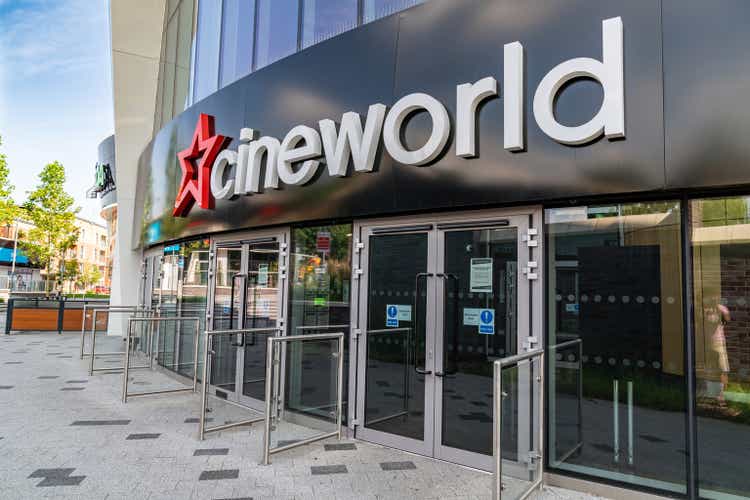Chaz Bharj/iStock Editorial via Getty Images
Cineworld (OTCPK:CNNWF) announced on Wednesday that the group was taking steps to strengthen its balance sheet strength and flexibility, which includes discussions with shareholders:
In connection with these initiatives, the Group remains in active discussions with various stakeholders and is evaluating various strategic options to both obtain additional liquidity and potentially restructure its balance sheet through a comprehensive deleveraging transaction. Any deleveraging transaction will likely result in very significant dilution of existing equity interests in Cineworld.
It was only a matter of time before Cineworld released an announcement like this regarding its liquidity position and needs. My investment thesis has continually been bearish on Cineworld since August 2020, the company’s debt pile was out-of-control before the pandemic and became insurmountable during it. Cineworld’s share price fell 50% in response to the latest announcement, but it has further to fall in order to fully price in the reality of the current financial situation.
Insurmountable debt and latest news
Cineworld’s long-term debt position excluding leases at the end of 2021 was $5.02B. This compared to a cash position of just $345M. Heavily disrupted by COVID, Cineworld delivered just $490M in EBITDA for the FY21, $486M of which came in the H2 – which was a notably strong half for Cinema where many chains across the world experienced a bounce-back. Despite significant improvement in H2, OCF was still down from pre-pandemic (H2 2019) $758M. Taking into account CAPEX (investing cash flow) and financing activities, Cineworld’s free cash flow was just $174M for 2021. With a heavily indebted balance sheet, Cineworld desperately needed a swift recovery to have any chance of paying down its debt and deleveraging its balance sheet.
That recovery quite clearly didn’t come, as outlined by the company in the latest announcement:
Cineworld is providing an update today on its current trading, liquidity position and capital structure and the ongoing impact of the COVID-19 pandemic on the Group. Despite a gradual recovery of demand since re-opening in April 2021, recent admission levels have been below expectations. These lower levels of admissions are due to a limited film slate that is anticipated to continue until November 2022 and are expected to negatively impact trading and the Group’s liquidity position in the near term.
The ‘below expectations’ admission levels are extremely disappointing. It’s not quite clear whether that is post H1 (July and August), H1 or both. We will get more clarity on this when Cineworld reports its results in early September. The company was quick to blame the current situation on a weak film slate, yet many of its peers such as Everyman Media Group and Canadian-based Cineplex (OTCPK:CPXGF) have both delivered strong recent results. Everyman, in particular, saw record revenues in both H2 of 2021 and H1 of 2022 and remains optimistic that it can meet market expectations for the FY (would be a record). So I don’t think it’s as simple as a film slate issue, Cineworld in its own right is losing traction in comparison to other offerings.
This has forced Cineworld to pursue a deleveraging transaction, a transaction that has really been necessary for well over a year but the board has staved off. Wording is key in these announcements, and there has been quite clear pivot from focusing on ‘shareholder value’ to now maximizing ‘enterprise value’. Highlighting the change in management’s focus away from acting in the interests of shareholders to all stakeholders now.
The Cineplex legal dispute and subsequent recent outcome in favor of Cineplex has really put the nail in the coffin for Cineworld – I see no chance of a turnaround. Cineworld is going to appeal this decision, but this appears to be out of hope more than anything else. With a long queue of creditors lining up to recoup some of their losses, I highly doubt much if anything is going to be left for shareholders.
Conclusion
The market and Cineworld shareholders can no longer hide from reality. The company has now essentially outlined that significant dilution is coming. I think this is really just the start, with a debt pile of over $5B and little cash on hand I do not see how current shareholders would be given little or any equity in a newly structured Cineworld. Sell.


Be the first to comment